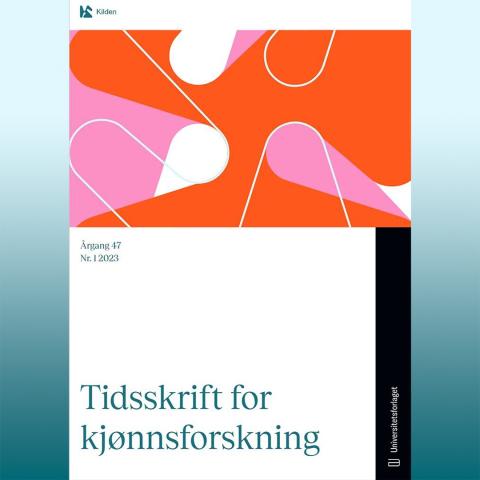The Journal of Gender Research: Open issue

This year's first edition presents articles that in different ways have gender politics as the focal point. The contributions range from challenging cisnormativity as a strategy to include transgender people, to women's political perspectives on reactionary voices in today's abortion debate, and reflections on the importance of acknowledging "the different other." In other words, they use different feminist approaches when they show how discourses and practices contribute to reproducing oppression, marginalization, and hierarchies.
DOI: https://www.idunn.no/doi/10.18261/tfk.47.1.2
Norm-critical tools for the inclusion of transgender people:
Incompleteness and anarcha-feminist intersectionality
By: Miriam Aurora Hammeren Pedersen and Sonia Muñoz Llort
Can collective inclusion of transgender people on a societal level be achieved by unlearning the institutionalized social norms of gender binarism and cisnormativity? Building on social-anthropological and anarcha-feminist perspectives, we attempt to show how our society’s dominant views on gender can be turned in a more constructive, inclusive and liberating direction. We argue that a view on gender based on anarcha-feminist understandings of intersectionality and Francis Nyamnjoh’s incompleteness framework can contribute to a more inclusive society which will benefit everyone, cis and trans alike.
DOI: https://www.idunn.no/doi/10.18261/tfk.47.1.3
ʻPro-life’ Discourse in Serbia and Norway – How Women Are Made Invisible
By: Tamara Ivančević
Despite the fact that neither medicine, law, religion nor a particular ideological view can explain all the perspectives on the abortion debate and assert an irrevocable ethically correct side, the ʻpro-life’ discourse is often characterized by hard, uniform beliefs and positions that are presented as the only true and completely ethically correct. As in all other discourses, metaphors play an important role because they can simultaneously evoke strong emotions and make claims convincing. The paper aims to present and analyse ʻpro-life’ discourses in two different contexts, Serbia and Norway, to examine how pro-life discourses differ from each other in the degree to which they claim the right to the only truth, and thus indeed the right to complete power.
DOI: https://www.idunn.no/doi/10.18261/tfk.47.1.4
Difference as a condition for development
A reflection on the practice/theory dualism in light of the philosophy of Luce Irigaray
By Grethe Nina Hestholm
In this article, I compare Ryle’s understanding of knowing how and knowing that with Irigaray’s understanding of gender difference. I find the same structures in and between these dualisms; it is not possible, neither in the theory/practice nor in the male/female dualism, to deduce the one part only through knowledge of the other. The parts are nevertheless mutually dependent on each other – awareness of the different other can help generate awareness of that which defines itself. The school can play a decisive role in cultivating this awareness: a one-sided development of one part leads to alienation and paralysing conformism for both, while a representation of and mediation between both parties supports mutual development and intersubjectivity. In the teacher practice at lower secondary school in the Vocational Teacher Education (PPUY), general and vocational knowledge cultures meet for two weeks. Does this meeting bring about a mutual awareness of the other?
Read the full issue: https://www.idunn.no/toc/tfk/47/1